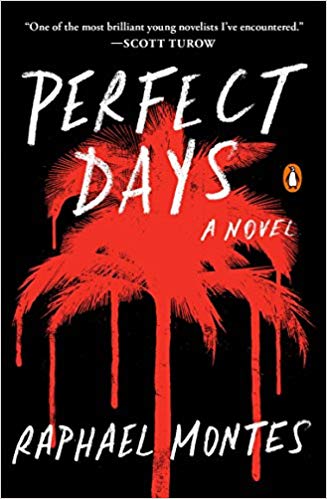Last week’s post on Alan Silvestri’s score for Predator didn’t have any room to touch on the bombastic ending that was Schwarzenegger vs. Alien From Unknown Planet.

Man, what a spectacle. Muscle and teeth and gutteral roars vs. creepy four-pronged jaws and lazers and bombs and stuff. Lazers! Helicopters! Green gooey blood! HUGE explosions! It’s an ending that has you knocking your beer over as you cheer for Earth’s Last Action Hero. Kick interplanetary ass, Arnie!
Now, what if I told you that the ending to Raphael Montes’ Perfect Days is just as powerful as the Predator’s time bomb?
Perfect Days doesn’t end with an explosion, or aliens, or any of that. It’s a novel of the thriller genre, a tale told of one man’s love for a girl and the lengths to which he’ll go–i.e., abduction, rape, and murder–to have her.
(Spoilers abound. I still recommend the read, if you can handle this sort of thing.)
Are you familiar with the concept of “bookending”? It’s a method I recommend to my students when they don’t know how to write a conclusion paragraph for an essay. You look at how you began your work, and see what element can be brought back in the end.
In short, set up in the beginning for the pay off at the end.
No, it’s not easy, because for once it’s a pay off you don’t want readers looking for. This element needs to be something it feels like characters have walked away from, discarded, grown from, etc. Such is the case with Teo, a student on the verge of graduating med school. The book opens during one of his last classes.
Gertrude was the only person Teo liked. The other students weren’t quite as at ease around her….Teo didn’t want anyone to notice how good he felt there. He’d walk over to the metal table with his head down.
There she’d be, serenely waiting for him. Gertrude. …
In her company, his imagination knew no bounds. The world melted away, until he and Gertrude were all that was left. (1-2)
Teo, our main character, has forged a relationship with a corpse. Not physical, but intimate. Opening this way, Montes not only shows readers how uncomfortable Teo is around other people, but how much his imagination fills in reality for him; for instance, when another student makes a conclusion about something, Teo wants to laugh, “And if Gertrude could have heard that nonsense, she’d have hooted with laughter too” (3). Teo “knows” Gertrude, even though Gertrude is not this corpse’s name. He’s studied this body, and imagined all the rest. When the class–and chapter–end, so ends his time with Gertrude, and Teo is “alone again” (4). The character must now move on from this point.
So readers move on as well, and see Teo attend a party with his mother and meet Clarice, a petite free-spirit whose brief conversation leaves him absolutely smitten. He uses the university database to find her and, after another encounter, ends up striking her unconscious and taking her to the flat he shares with his mother.
He felt bad: it was the first time he had thought of himself as a villain. By stuffing Clarice in a suitcase and bringing her home, had he become a criminal? (32)
(I just had to share that line. No, this isn’t asked sarcastically–Teo genuinely contemplates whether or not he’s done something wrong. What a killer bit of pov.)

For the majority of the novel, Teo has Clarice locked up in two different cabins Clarice has used in the past, cabins owned by others who are used to her coming and going. At one point in the first cabin they’ve settled into a routine of sorts, and Teo begins to open up about his personal life.
He even mentioned Gertrude….He told her a serious [sic] of funny anecdotes about things he’d done with Gertrude. Clarice found it interesting that he was friends with a much older woman and said she wanted to meet her….It made him a little ill at ease, as he didn’t want to spoil things by telling her that Gertrude was a corpse. (81)
Teo doesn’t talk about Gertrude again with Clarice, and as tensions mount in Teo’s determination to keep Clarice and avoid arrest, readers don’t think much about Gertrude, either. Teo kills Clarice’s boyfriend, rapes Clarice, and even severs her spine to prevent her escape.
Climax: Teo is driving off a ferry, certain Clarice is still unconscious in the passenger seat from the last dose of sedative. But Clarice suddenly yanks the steering wheel, and their car goes straight into a restraining wall. Teo wakes up in a hospital. Surely it’s all over, with her family and police present, asking questions.
Yet there are no charges.
He asks to see Clarice, and is escorted to her room.
When Clarice looked up at him…she stared at him with unprecedented interest… “I’m sorry, but… who are you?” (253)
She couldn’t remember having seen Teo before, or what had happened in the previous month or year…. She seemed truly perplexed that she was engaged. (254)
The advantage of her lack of memory was that he could tell her whatever he wanted; he exaggerated the details in order to make it all sound poetic and inevitable. (255)
As the last chapter progresses, we can’t help but think Teo’s won. He’s successfully avoided the police and familial scrutiny. He marries Clarice, and all is as it should be.
Clarice was having fewer nightmares, although sometimes she’d still wake up acting strangely, and it was very distressing–she’d shout and break plates of food against the wall, saying they’d been poisoned. Maybe their marriage wasn’t perfect, but there were much worse ones out there. (260)
Last page: Clarice is pregnant. A family! Teo’s happy, and “Clarice appeared to be too” (260). Teo’s overwhelmed with love when they learn they’re having a girl, and is about to speak when Clarice interrupts him.
She smiled at Teo and said, “A beautiful name came to me just now. Gertrude. What do you think, my love?”
**********BOOM**********
No last-minute duel. No savior to put all things to right. But BOOM nonetheless.
Why?
A few things.
First, we’re left wondering about Clarice. Did she really lose her memory? She still calls him “my love.” But such a name as Gertrude…oh, that does not come out of the blue. We wonder now if Clarice is no longer trying to escape, but to dominate. Perhaps she has plans of her own for Teo.
Speaking of Teo, is he going to panic and kill Clarice? He’s killed his mother’s dog and Clarice’s boyfriend, so the act is not beyond him. He’s never handled moments of Clarice’s superiority well at all. Yet she’s smiling at him, calling him “love.” Will Teo leave his wife and unborn child lifeless as he did the corpse Gertrude at the end of the first chapter, and be alone all over again?
We do not know. We will never know.
That name, that single little element, is Montes’ bookend. He took the single most vulnerable point in the Teo’s life and gave it a body–a lifeless body, but a body nevertheless. And like all bodies left unburied, they come back to haunt even the most resilient of natures. By waiting until the absolute last line, Montes leaves readers in the wake of a narrative bomb: we don’t know if blood will be shed, if foundations will be cracked, or if all will go on as before, with “distressing” moments that might, just might, lead to a peculiar food poisoning.
So as you work out your ending, writers, ask: What element from the opening chapters can help create a narrative bookend? Perhaps a person, a token, a place may return. It could be as monumental as a dream fulfilled, or as momentary as a single name whispered on dying lips. It all depends if you wish to leave your readers happily tired by the journey, or blinded by the bomb. Either way, they’ll return to you knowing thrills are hidden in every chapter, right down to the final line.
~*~*~*~*~
All aboard…for the December Newsletter!
(Oh don’t you think I’m done with Alan Silvestri yet. I’ve got a word or three to say about his score for The Polar Express.)
Subscribe so you don’t miss another round-up of terrific offerings from fellow Indie creators as well as updates on my own projects. I’d be happy to share your work, too! Just contact me with your plug and I’ll include it in next month’s newsletter.
Read on, share on, and write on, my friends!


Dark and getting darker ~ George
LikeLiked by 1 person
Indeed. Just in time for Christmas! 🙂
LikeLiked by 1 person
Wow. And… disturbing.
>
LikeLiked by 1 person
Mmmmmmmmhmm. 🙂
LikeLike
Big Arnie lives in a different universe to the rest of us, he writes his own endings.
That’s a dark Teo character. Kinda makes you want more which is exactly what you are talking about.
When you say how you started the story. Should that be earlier the better like the first page or first chapter?
LikeLiked by 1 person
Good question! I think it depends. Montes worked it into the very first line of his novel, but I’d say if you’re in the first chapter, then that counts as “the beginning.” It all depends on the point of view and voice for the story.
LikeLike
The best, least-spectacular but most-effective novel ending, for me, has to be Ursula K LeGuin’s “A Wizard of Earthsea”. “Perfect Days” does seem quite dark.
LikeLiked by 1 person
Great choice! I think with the spectacle of cinema today we forget that books don’t need that HUUUUUUUUGE ending. It’s okay to be subtle and a bit uncertain.
LikeLiked by 1 person
My dear….. another great post. xxxxxxxxxxx
LikeLiked by 1 person
Thank you kindly, O Sweet Lady Shey xxxxxxxxxxxx
LikeLiked by 1 person
Great post. Amazing when a name can carry so much punch.
LikeLiked by 1 person
I know, right? Everything carried in a single word just slams down upon the character and reader alike and just leaves you breathless. So amazing.
LikeLiked by 1 person
Hi. I gotta tell you: this book is way too violent for me. It’s not on my TBR list!
LikeLiked by 1 person
Oh that’s fine. Stories like this are NOT for everyone.
I like that his own mom bugged him about his writing. He says as much in the Acknowledgements: his mom read his previous novel, and asked why he had to write such violent things and to do something nice instead, like a love story. Perfect Days is the result of her request.
Yowza, right?
LikeLiked by 2 people
How do you have the time to put so much oomph into your blog posts?! You are a force of nature!
LikeLiked by 1 person
Oh other things tend to fall to the wayside, like, um, editing, ahem… 🙂
But it helps I read this novel a while ago and have wanted to write up this post for a while.
LikeLiked by 1 person
WOW. It sounds like a fascinating read, but one that would leave me with the “creeps” for a loooong time. 🙂 Great topic, too – I love that sort of bookend, when the author ties it all together and I hope it’s coming but don’t see it until it does!
LikeLiked by 1 person
Yes, I don’t think this is your kind of read, but YES to the ending–it’s the perfect move that opens sooooooo many possibilities about the female character while also closing the arc on the main character Teo. Just bloody brilliant.
LikeLiked by 1 person
As always fascinating, and this time, disturbing. That’s quite a summary, how can you have made all that darkness sound so reasonable? I think because you’ve proved your point. What an interesting post.
LikeLiked by 1 person
Oh it’s chilling how logical it all reads, as you read from the stalker/killer’s point of view. I read another such novel recently, but the author wrote stream-of-conscious style so often that the run-ons lost a lot of their impact. You can *feel* the crazy there. Here, it’s very logical. Almost cold. Like, you find yourself nodding along until something truly terrible happens, and you just go HOLY ******* WHAT IS THIS MAN DOING?! And you have to remind yourself he was ALWAYS like this.
LikeLiked by 1 person
It does sound like it got right under your skin.
LikeLiked by 1 person
It did indeed. x
LikeLiked by 1 person
Good boy Arnie :). Dark creep Teo – yet everything works out for him perfectly. Until “the boom”. I like it that Montes leaves a lot to the imagination. I already have a few scenarios LOL
LikeLiked by 1 person
Yes exactly! I’d like to think she’s accepted she can’t escape him, so now she’s going to break him just as he literally broke her. And I totally believe she could do it, too. x
LikeLiked by 1 person
Yes, I do love this scenario! xx
LikeLiked by 1 person
That’s been really useful as I come to tie everything up at the end of my wip novel!
LikeLiked by 1 person
Awesome!
LikeLiked by 1 person
Eeek! That is a chilling end… and no – I couldn’t possibly read a book that deals with such stuff. I have enough problems with nightmares as it is… But thank you for this helpful, thought-provoking post.
LikeLiked by 1 person
Indeed. I know stories like these are not for everyone, but when I see such a killer move like this, I just had to share it. 🙂
LikeLiked by 1 person
Oh yes… and it doesn’t have to limited to being used in such a very creepy way!
LikeLiked by 1 person